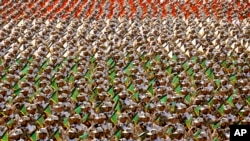Iran has sent thousands of undocumented Shi'ite Afghan refugees to Syria to fight alongside forces of the Lebanese militant group Hezbollah and Iran’s elite Revolutionary Guard forces in support of the government of Syrian President Bashar al-Assad, sources in Iran and Afghanistan told VOA.
Thousands of Afghans from Iran are in the “Fatemiyon Brigade,” the second largest group of foreigners fighting for Assad in Syria. Western media estimate their numbers at between 10,000 and 12,000.
Human Rights Watch (HRW) reported on Friday that some Afghans are sent against their will. Iran has said Afghans are going to Syria voluntarily.
Iran’s Revolutionary Guard Corps, which is also fighting for Assad in Syria, recruits Afghans with promises of Iranian citizenship and improved living standards for their families.
“Iran has not just offered Afghan refugees and migrants incentives to fight in Syria, but several said they were threatened with deportation back to Afghanistan unless they did [complied],” Peter Bouckaert, emergencies director at Human Rights Watch, said in a statement.
Afghan fighters are paid between $400 and $600 per month, said Phillip Smyth a researcher at the University of Maryland and author of the blog "Hezbollah Cavalcade." Some Afghans are pulled from prisons to go fight in the battlefields of Syria, Smyth said.
“In other cases, undocumented Afghan [Shi'ite] refugees are threatened with jail time if they don't serve,” he said.
Roughly three million Afghans live in Iran. Most settled there after fleeing war and conflict in their homeland. Many Afghans in Iran lack basic rights and live without a formal status. About 950,000 are classified as refugees.
Afghans in Iran sent to Syria come mainly from Qum and Mashhad — centers for a majority of the Afghan diaspora.
Iranian sources told VOA that Afghans are being sent to the Syrian frontlines to defend the Zeinab Shrine, a holy site for Shi’ite Muslims.
Syrian rebel commanders say they face Afghan fighters throughout the country.
“Their presence has been stronger than ever,” said Islam Alloush, spokesman for the Army of Islam, the main opposition force in eastern Damascus.
“But they are mainly based in Aleppo,” he told VOA. “They have units around Damascus. The regime relies on them because it is running out of manpower.”
The commander of Iran’s Quds Force, Major General Qassem Soleimani, has paid visits to the Afghan brigade in Syria, according to Iranian media reports, and took pictures with some of its members.
The Afghan units have been trained in Lebanon-based camps run by Hezbollah and fight alongside the Lebanese militant group in Syria, researcher Smyth said. Most of them reportedly receive anywhere from 10 days to one month of preliminary training in Mashhad and in southern outskirts of Tehran prior to their deployment to Syria, Iranian sources told VOA.
Reports indicate that Afghan casualties in Syria are mounting as Iranian-backed fighters have become a major ground force for the Assad regime.
Ali Alfoneh, a senior fellow at the Foundation for the Defense of Democracies who tracks Syrian war casualties, told VOA that more than 200 Afghan fighters have been killed in Syria since September 2012.
“They are lured in to sacrifice their lives for a few hundred dollars,” Mujtaba Jalali, an Iranian-born Afghan photographer from Mashhad who covered the public funerals of Afghan fighters, told VOA.
The families of Afghans who serve in Syria receive benefits in Iran.
“This is a very good gateway for some Afghan refugees to put their step into a new life if they come back alive,” a Tehran-based Afghan who lost his brother in the Syria fighting told VOA on the condition of anonymity.
“In our case, my brother sacrificed himself for his family,” he said. “My mother can now receive medicine for her ill heart and the rest of family gained Iranian valid documentation.”
Iran’s Foundation of Martyrs and Veterans Affairs offers financial help, spiritual support, and medical expenses for the families of Afghan casualties. But Human Rights Watch said in its report on Friday that compensation is arbitrary. The Afghan government says it is investigating reports of Afghans fighting in Syria.
Qayyum Sajjadi, a Shi’ite parliament member in Afghanistan, says the harsh socioeconomic circumstances that Afghan refugees face in Iran force them to participate in regional conflicts.
“These youths in Iran are sent to Syria where they either die or get captured by opposition groups,” Jamaluddin Sayyar, head of the provincial council in Afghanistan's Kunar province, told Radio Liberty.
Human Rights Watch said that Iran must stop using Afghans to fight in Syria.
“Iran should be offering greater protection to Afghan refugees, not coercively recruiting them to fight for Assad,” HRW’s Bouckaert said in a statement.






